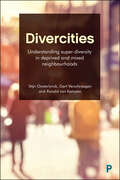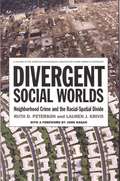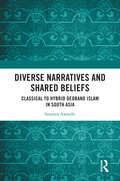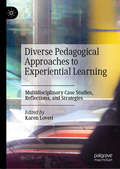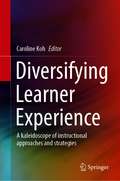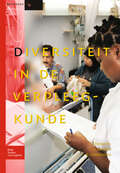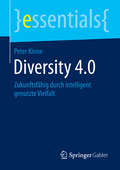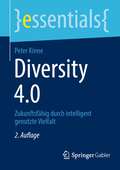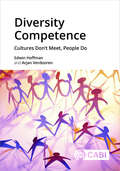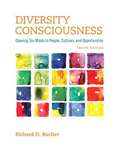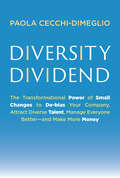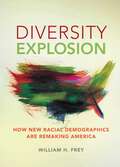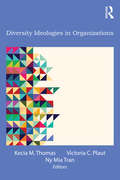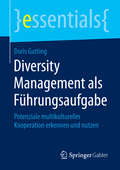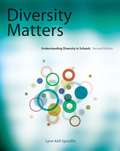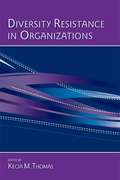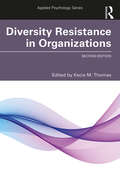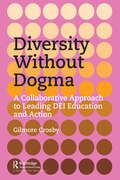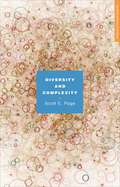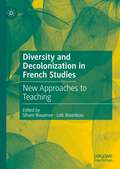- Table View
- List View
Divercities: Understanding Super-Diversity in Deprived and Mixed Neighbourhoods
by Stijn Oosterlynck, Gert Verschraegen and Ronald van KempenHow do people deal with diversity in deprived and mixed urban neighbourhoods? This edited collection provides a comparative international perspective on superdiversity in cities, with explicit attention given to social inequality and social exclusion on a neighbourhood level. Although public discourses on urban diversity are often negative, this book focuses on how residents actively and creatively come and live together through micro-level interactions. By deliberately taking an international perspective on the daily lives of residents, the book uncovers the ways in which national and local contexts shape living in diversity. The book will be a valuable resource for researchers and students of poverty, segregation and social mix, conviviality, the effects of international migration, urban and neighbourhood policies and governance, multiculturality, social networks, social cohesion, social mobility, and super-diversity.
Divergent Social Worlds: Neighborhood Crime and the Racial-Spatial Divide
by Ruth D. Peterson Lauren J. KrivoMore than half a century after the first Jim Crow laws were dismantled, the majority of urban neighborhoods in the United States remain segregated by race. The degree of social and economic advantage or disadvantage that each community experiences--particularly its crime rate--is most often a reflection of which group is in the majority. As Ruth Peterson and Lauren Krivo note in Divergent Social Worlds, "Race, place, and crime are still inextricably linked in the minds of the public. " This book broadens the scope of single-city, black/white studies by using national data to compare local crime patterns in five racially distinct types of neighborhoods. Peterson and Krivo meticulously demonstrate how residential segregation creates and maintains inequality in neighborhood crime rates. Based on the authors' groundbreaking National Neighborhood Crime Study (NNCS), Divergent Social Worlds provides a more complete picture of the social conditions underlying neighborhood crime patterns than has ever before been drawn. The study includes economic, social, and local investment data for nearly nine thousand neighborhoods in eighty-seven cities, and the findings reveal a pattern across neighborhoods of racialized separation among unequal groups. Residential segregation reproduces existing privilege or disadvantage in neighborhoods--such as adequate or inadequate schools, political representation, and local business--increasing the potential for crime and instability in impoverished non-white areas yet providing few opportunities for residents to improve conditions or leave. And the numbers bear this out. Among urban residents, more than two-thirds of all whites, half of all African Americans, and one-third of Latinos live in segregated local neighborhoods. More than 90 percent of white neighborhoods have low poverty, but this is only true for one quarter of black, Latino, and minority areas. Of the five types of neighborhoods studied, African American communities experience violent crime on average at a rate five times that of their white counterparts, with violence rates for Latino, minority, and integrated neighborhoods falling between the two extremes. Divergent Social Worlds lays to rest the popular misconception that persistently high crime rates in impoverished, non-white neighborhoods are merely the result of individual pathologies or, worse, inherent group criminality. Yet Peterson and Krivo also show that the reality of crime inequality in urban neighborhoods is no less alarming. Separate, the book emphasizes, is inherently unequal. Divergent Social Worlds lays the groundwork for closing the gap--and for next steps among organizers, policymakers, and future researchers. A Volume in the American Sociological Association's Rose Series in Sociology
Diverging Destinies
by James M. Raymo Miho IwasawaThe overarching objective of this book is to summarize, extend, and update previous research on educational differences in family behavior in Japan. This is the first comprehensive treatment of the subject and the first to evaluate family differentials in Japan in the context of ideas articulated in research on "diverging destinies" and "patterns of disadvantage" as part of the second demographic transition. Much of the previous work in this area has been conducted by the authors (Raymo and Iwasawa), and the longer format of this book allows us to reexamine a wide range of family outcomes using newer data and to provide a thorough and systematic evaluation. The text uses multiple sources of data that cover a period of rapid family change (1970s through 2010s) to describe trends in educational differences in a wide range of family behaviors linked to the well-being of both parents and children. Descriptive analyses provide an overview of period and cohort trends in educational differences in age at first marriage, assortative mating, cohabitation, bridal pregnancy, divorce, remarriage, age at first birth, unintended childbearing, single motherhood, maternal employment, and family-related attitudes. Multivariate analyses provide insights into the processes underlying observed educational differences in family behavior. Patterns of educational differences in family behavior in Japan are evaluated with reference to findings from related research in the United States and other low-fertility Western societies.
Diverse Narratives and Shared Beliefs: Classical to Hybrid Deoband Islam in South Asia
by Soumya AwasthiThis book delves into the intricate tapestry of Deoband Islam in India, Pakistan, and Afghanistan. Challenging simplistic narratives, it unveils the nuanced reality of Deoband Islam, revealing a diverse range of perspectives within the movement. It illuminates the movement's historical, social, and philosophical dimensions. It explores the movement's relationship with societal transformation and communal identity and its impact on the geopolitical dynamics of South Asia.The book offers a distinctive perspective on the Deoband school of thought in Islam by systematically categorising it into three distinct regional variants, each reflecting the unique socio-political context of its environment. The focus is on the Deoband school of thought, a strand within Sunni Islam that adheres to the philosophical framework of Ashari Maturidi. Critically examining its teachings uncovers the complexities and contradictions that shape Deobandi's thought, challenging popular assumptions and providing a fresh understanding. It also highlights the voices of Deobandi scholars and organisations who unequivocally denounce terrorism and actively work to counter radicalisation. Acknowledging their efforts, the book underscores the potential for dialogue and cooperation in promoting peace and understanding.With its comprehensive approach and thought-provoking analysis, this book is essential for scholars, policymakers, political science departments, theology, sociology, international relations, security studies, and South Asian studies.
Diverse Pedagogical Approaches to Experiential Learning: Multidisciplinary Case Studies, Reflections, and Strategies
by Karen LovettThis edited collection offers a unique multidisciplinary perspective into the many factors that go into designing, facilitating, expanding, and assessing experiential learning (EL) from the perspective of faculty and staff educators. The editor and contributors bring decades of expertise with different forms of EL, including community-engaged learning, education abroad, internships, and more. Chapters offer case studies and reflections which highlight personal experiences and anecdotes which illuminate the realities of experiential teaching and learning. Through these stories and narratives, readers may better understand what doing EL entails on an everyday basis—both on a local and global scale—and learn how to enhance support and resources for experiential educators on college and university campuses.
Diverse Voices in Chinese Translation and Interpreting: Theory and Practice (New Frontiers in Translation Studies)
by Riccardo Moratto Martin WoeslerThis book presents a thoughtful and thorough account of diverse studies on Chinese translation and interpreting (TI). It introduces readers to a plurality of scholarly voices focusing on different aspects of Chinese TI from an interdisciplinary and international perspective. The book brings together eighteen essays by scholars at different stages of their careers with different relationships to translation and interpreting studies. Readers will approach Chinese TI studies from different standpoints, namely socio-historical, literary, policy-related, interpreting, and contemporary translation practice. Given its focus, the book benefits researchers and students who are interested in a global scholarly approach to Chinese TI. The book offers a unique window on topical issues in Chinese TI theory and practice. It is hoped that this book encourages a multilateral, dynamic, and international approach in a scholarly discussion where, more often than not, approaches tend to get dichotomized. This book aims at bringing together international leading scholars with the same passion, that is delving into the theoretical and practical aspects of Chinese TI.
Diversifying Learner Experience: A kaleidoscope of instructional approaches and strategies
by Caroline KohThis book brings together strategies and innovations that educators from diverse educational contexts have conceptualized and implemented to cater to differences in academic ability, as well as in other domains such as psychosocial contexts and developmental needs. The emergence of IT and new technologies have altered the educational landscape and opened a multitude of opportunities for diverse modes of instruction catering to diverse student populations.The book addresses the gap in the literature with evidence-based reports of innovative strategies and approaches that are grounded in educational research. It identifies student differences in terms of academic ability and also, with regard to their cultural and social background, their developmental and psycho-emotional needs. It examines how new technologies are used in instructional approaches and how these innovative strategies diversify learner experiences. The book is a valuable resource to practitioners, researchers and educational administrators.
Diversiteit in de verpleegkunde
by P. Esterhuizen A.U. Kuckert-PanderVerpleegkundigen staan dicht bij mensen. Inlevingsvermogen en mensenkennis zijn onmisbaar voor goede observaties, klinisch redeneren of voor het kunnen geven van steun. Hoe herken je als verpleegkundige diversiteit en hoe geef je dat een goede plek in je handelen? Dit boek maakt de complexiteit van het onderwerp ‘diversiteit’ zichtbaar en biedt tegelijkertijd handvatten. Het boek laat zien hoe belangrijk de dialoog met patiënten is en hoe een verpleegkundige kennis over groepskenmerken kan combineren met het oog hebben voor unieke eigenschappen. Op het eerste oog homogene groepen patiënten kunnen veel diversiteit bevatten. De auteurs benaderen het onderwerp ‘diversiteit’ vanuit verschillende perspectieven. De complexiteit van het onderwerp wordt hierdoor goed zichtbaar. Dat diversiteit centraal staat in dit boek is niet alleen te zien aan de titel, maar ook aan de diversiteit in de opbouw van hoofdstukken. Elk hoofdstuk kan op zichzelf gelezen worden. Drie hoofdstukken zijn in de Engelse taal geschreven. Niet alleen de opbouw en de taal van de hoofdstukken is divers, maar ook de auteurs zelf verschillen in leeftijd, geslacht, gezinssituatie, opleiding (verpleegkunde, culturele antropologie, sociologie, etc.) en woonplaats (Nederland, Duitsland, Groot-Brittannië, Amerika).
Diversities Old and New
by Steven VertovecDiversities Old and New provides comparative analyses of new urban patterns that arise under conditions of rapid, migration-driven diversification, including transformations of social categories, social relations and public spaces. Ethnographic findings in neighbourhoods of New York, Singapore and Johannesburg are presented.
Diversity 4.0: Zukunftsfähig durch intelligent genutzte Vielfalt (essentials)
by Peter KinneDas essential eröffnet neue Perspektiven für den Umgang mit sozio-kultureller Vielfalt in Organisationen. Es beleuchtet betriebswirtschaftlich-systemische Hintergründe, zeigt das Potenzial von Vielfalt zur Bewältigung von Komplexität, deckt Synergiepotenziale zwischen Diversity-, Qualitäts-, Innovations-, Marken- und Change-Management auf und liefert die Verbindung zu einer auf Ausgewogenheit basierenden, zukunftsorientierten Managementstrategie. Es beschreibt ein differenziertes Konzept, anhand dessen der Umgang mit Vielfalt zielorientiert geplant und so gesteuert werden kann, dass er nicht nur die Produktivität, sondern auch die Zukunftsfähigkeit von Organisationen verbessert.
Diversity 4.0: Zukunftsfähig durch intelligent genutzte Vielfalt (essentials)
by Peter KinneDas essential eröffnet neue Perspektiven für den Umgang mit sozio-kultureller Vielfalt in Organisationen. Es beleuchtet betriebswirtschaftlich-systemische Hintergründe, zeigt das Potenzial von Vielfalt zur Bewältigung von Komplexität, deckt Synergiepotenziale zwischen Diversity-, Qualitäts-, Innovations-, Marken- und Change-Management auf und liefert die Verbindung zu einer auf Ausgewogenheit basierenden, zukunftsorientierten Managementstrategie. Es beschreibt ein differenziertes Konzept, anhand dessen der Umgang mit Vielfalt zielorientiert geplant und so gesteuert werden kann, dass er nicht nur die Produktivität, sondern auch die Zukunftsfähigkeit von Organisationen verbessert.
Diversity Competence: Cultures Don’t Meet, People Do
by Dr Edwin Hoffman Arjan VerdoorenIn today's world many people live, learn and work in international and multicultural environments. Intercultural communication has become an important topic in many fields of work and study. Given the complexities of globalization, knowledge of cultures and cultural differences is rarely sufficient. In this book, interpersonal communication forms the point of departure: the meeting of people, not of cultures. The authors describe what diversity competence entails: which processes, challenges and skills are relevant in a 'superdiverse' world. They demonstrate how the TOPOI model offers an inclusive, communicative approach to analyzing and addressing potential miscommunication. - Addresses controversial topics frankly and clearly without being simplistic. - Discusses theory from several different fields. - Case studies provide practical examples and guidelines. - Companion website with extra case studies and study assignments. The target audience for Diversity Competence includes students, educators and professionals in the fields of communication and media, business, management and leadership, governance and international relations and cooperation.
Diversity Competence: Cultures Don’t Meet, People Do
by Dr Edwin Hoffman Arjan VerdoorenIn today's world many people live, learn and work in international and multicultural environments. Intercultural communication has become an important topic in many fields of work and study. Given the complexities of globalization, knowledge of cultures and cultural differences is rarely sufficient. In this book, interpersonal communication forms the point of departure: the meeting of people, not of cultures. The authors describe what diversity competence entails: which processes, challenges and skills are relevant in a 'superdiverse' world. They demonstrate how the TOPOI model offers an inclusive, communicative approach to analyzing and addressing potential miscommunication. - Addresses controversial topics frankly and clearly without being simplistic. - Discusses theory from several different fields. - Case studies provide practical examples and guidelines. - Companion website with extra case studies and study assignments. The target audience for Diversity Competence includes students, educators and professionals in the fields of communication and media, business, management and leadership, governance and international relations and cooperation.
Diversity Consciousness: Opening Our Minds To People, Cultures, And Opportunities
by Richard D. BucherFor courses in Success/Orientation, Diversity (ie. Managing Diversity), Race and Ethnic Relations, Cultural Diversity in the Workplace, Multiculturalism and Inclusion (ie. leadership, group dynamics, teaching, social media/networking), Education, Nursing, Human Relations, Communications, Hospitality, Social Work/Family Therapy/Human Services, EMS and Fire Science, Counseling, Criminal Justice, Social Justice/Equity; also for teacher-training education courses, and staff/professional development workshops. This work on human diversity integrates personal and organizational perspectives, research, and theories while discussing teamwork, communication, leadership, conflict, social networking, and other issues in the workplace, at school, and in the community. Diversity Consciousness empowers students by helping them develop a "mind-set" which will enable them to be more successful in the 21st century.
Diversity Dividend: The Transformational Power of Small Changes to Debias Your Company, Attract Dive rse Talent, Manage Everyone Better and Make More Money
by Paola Cecchi-DimeglioFrom entry-level to the boardroom, what works to create large-scale change in organizations looking to accelerate their diversity, equity, and inclusion efforts and reap financial benefits.Every leader endeavors to invest in and manage their key asset—talent—to be as high-performing as possible. Like a winning stock, successful diversity, equity, and inclusion (DEI) actions pay back over time. That dividend is paid both to the company—through not only higher performance but also talent acquisition, training, and other savings—and to society in general. In Diversity Dividend, Paola Cecchi-Dimeglio offers a fresh, detailed look at how to realize gender and racial equity along the company-employee pathway—from attracting and interviewing applicants to onboarding, promoting, and sustaining hires—and how to remove systemic barriers at the organizational level that prevent women and underrepresented groups from advancing. While other books have delved into DEI and the challenges inherent in sustaining successful efforts, no book has done so in concert with the depth and scope of data, basis in science, and application in the real world. In Diversity Dividend, Cecchi-Dimeglio artfully combines accessible anecdotal cases—where success was achieved or where, despite best intentions and efforts, things did not go as expected—with scientifically rigorous solutions as well as applications of data and big data.As empowering as it is comprehensive, Diversity Dividend helps remove the guesswork and near-superstition that naturally arise when some methods work and others fail, thereby giving leaders the tools and insight to make informed choices at the right moments to create lasting change.
Diversity Explosion
by William H. FreyAt its optimistic best, America has embraced its identity as the world's melting pot. Today it is on the cusp of becoming a country with no racial majority, and new minorities are poised to exert a profound impact on U.S. society, economy, and politics. In April 2011 a New York Times headline announced, "Numbers of Children of Whites Falling Fast." As it turns out, that year became the first time in American history that more minority babies than white babies were born. The concept of a "minority white" may instill fear among some Americans, but William H. Frey, the man behind the demographic research, points out that demography is destiny, and the fear of a more racially diverse nation will almost certainly dissipate over time.Through a compelling narrative and eye-catching charts and maps, eminent demographer Frey interprets and expounds on the dramatic growth of minority populations in the United States. He finds that without these expanding groups, America could face a bleak future: this new generation of young minorities, who are having children at a faster rate than whites, is infusing our aging labor force with vitality and innovation.In contrast with the labor force-age population of Japan, Germany, Italy, and the United Kingdom, the U.S. labor force-age population is set to grow 5 percent by 2030. Diversity Explosion shares the good news about diversity in the coming decades, and the more globalized, multiracial country that U.S. is becoming.Contents1. A Pivotal Period for Race in America2. Old versus Young: Cultural Generation Gaps3. America's New Racial Map4. Hispanics Fan Out: Who Goes Where?5. Asians in America: The Newest Minority Surge6. The Great Migration of Blacks--In Reverse7. White Population Shifts--A Zero-Sum Game8. Melting Pot Cities and Suburbs9. Neighborhood Segregation: Toward a New Racial Paradigm10. Multiracial Marriages and Multiracial America11. Race and Politics: Expanding the Battleground12. America on the Cuspics Fan Out: Who Goes Where? 5. Asians in America: Where They Matter Most 6. The Great Migration in Reverse 7. Zero-Sum Game: White Gains and Losses 8. Melting Pot Cities and Suburbs 9. Neighborhood Segregation-Delayed Declines 10. Mixed-Race Marriages and Multicultural America 11. Race and Politics: Red, Blue, and Purple States 12. New Racial Demographics and the Nation's Future
Diversity Explosion
by William H. FreyAt its optimistic best, America has embraced its identity as the world's melting pot. Today it is on the cusp of becoming a country with no racial majority, and new minorities are poised to exert a profound impact on U.S. society, economy, and politics. The concept of a "minority white" may instill fear among some Americans, but William H. Frey, the man behind the demographic research, points out that demography is destiny, and the fear of a more racially diverse nation will almost certainly dissipate over time.Through a compelling narrative and eye-catching charts and maps, eminent demographer Frey interprets and expounds on the dramatic growth of minority populations in the United States. He finds that without these expanding groups, America could face a bleak future: this new generation of young minorities, who are having children at a faster rate than whites, is infusing our aging labor force with vitality and innovation. In contrast with the labor force-age population of Japan, Germany, Italy, and the United Kingdom, the U.S. labor force-age population is set to grow 5 percent by 2030. Diversity Explosion shares the good news about diversity in the coming decades, and the more globalized, multiracial country that the U.S. is becoming.ContentsA Pivotal Period for Race in AmericaOld versus Young: Cultural Generation GapsAmerica's New Racial MapHispanics Fan Out: Who Goes Where?Asians in America: The Newest Minority SurgeThe Great Migration of Blacks-In ReverseWhite Population Shifts-A Zero-SumMelting Pot Cities and SuburbsNeighborhood Segregation: Toward a New Racial ParadigmMultiracial Marriages and Multiracial AmericaRace and Politics: Expanding the BattlegroundAmerica on the Cusp
Diversity Ideologies in Organizations: Diversity Ideologies In Organizations (Applied Psychology Series)
by Kecia M. Thomas Victoria C. Plaut Ny Mia TranSince the increased attention toward diversity in the workplace, the concepts of "diversity initiatives" and "diversity management" have become a common place in many conversations among academics and practitioners alike. The diversity movement in the workplace originated from the increased avocation for equal treatment of minority groups due to the dynamic composition of the modern workforce. Many organizations were forced to face these changes and the dilemma of how to respond to group differences to maintain and/or increase organization effectiveness and productivity. This volume will present new research on the colorblindness versus multiculturalism debate, assist in broadening the diversity ideology conversation, share this conversation across social science domains including industrial/organizational psychology, social psychology, and law and public policy, and highlight how the nature of diversity ideology may be fluid and therefore be different depending on the diversity dimension discussed.
Diversity Management als Führungsaufgabe: Potenziale multikultureller Kooperation erkennen und nutzen (essentials)
by Doris GuttingDieses Essential vermittelt einen Überblick über die aktuelle Diversity-Management-Debatte, bringt Beispiele aus Diversity-Management-Programmen verschiedener Unternehmen und erläutert deren Motive und Werkzeuge sowie die notwendigen Überlegungen zur Entwicklung eines Diversity-Management-Konzeptes. Organisationen weisen zunehmend heterogene Mitarbeiterschaften auf, die sich aus unterschiedlichen Kulturen, Altersgruppen und Weltsichten zusammensetzen. Dies kann Probleme hervorrufen, aber auch neue Chancen erschließen. Doris Gutting zeigt, wie man Konflikten aus der Zusammenarbeit verschiedener Kulturen gegensteuern und das Potenzial multikultureller Kooperation erkennbar und nutzbar machen kann.
Diversity Matters: Understanding Diversity in Schools (What's New in Education)
by Lynn SpradlinThere is no single "cookbook" approach to working effectively with a diverse classroom population--and that's why this book is so useful. Its practical, research-based approach prepares educators to meet the unique demands of their intercultural interactions armed with knowledge that assures proper, responsive, and ethical intercultural communication. Based on current research and enriched by the individual voices of those with diverse worldviews, the book provides abundant practical, theoretically sound approaches for addressing the needs of those who are marginalized in today's classroom. Designed to engage readers intellectually and emotionally, this distinctive book will move you from the realm of understanding (head), through personal valuing (heart), and finally to applying (voice) the information provided.
Diversity Resistance in Organizations (Applied Psychology Ser.)
by Kecia M. ThomasThis is a groundbreaking volume that provides informed, balanced yet frank discussion of US workplace diversity and diversity resistance issues. The chapters in this book put a name on behaviors and practices that have existed in the workplace for a long time, yet until recently have had no name. Further, the majority of the chapters innovativ
Diversity Resistance in Organizations (Applied Psychology Series)
by Kecia M. ThomasThis new volume revisits diversity resistance ten years later, examining the fluidity of diversity resistance in workplaces. Top-notch contributors provide insight about the motivations to resist diversity and inclusion as well as offer strategies for preventing and derailing diversity resistance and enhancing inclusion in organizations. The current edition broadens the conversation about diversity resistance by demonstrating methods of counter-resistance and how diversity resistance manifests in everyday lives, as well as how it presents itself and limits the careers and lives of various stigmatized groups. Chapters also consider why, despite the often expressed value for diversity and inclusion, diversity resistance continues to persist. Contributors demonstrate the persistence of diversity resistance across time, context, and for a variety of targets. For example, this volume addresses topics as well as marginalized groups not previously discussed in the first edition such as intersectionality, workers living with mental illness, gender identity, trans workers, and the systemic resistance experienced by gay couples. This volume will be of interest to scholars and practitioners as well as minoritized workers. It will function as a framework for understanding the continuum of exclusion, harassment and discrimination that occurs within organizational settings and the impact upon individual and organizational performance. Practitioners will find examples and cases for how diversity resistance manifests, but more importantly strategies and recommendations for derailing diversity resistance and enhancing inclusion.
Diversity Without Dogma: A Collaborative Approach to Leading DEI Education and Action
by Gilmore CrosbySocial Scientist Kurt Lewin said, "No research without action, and no action without research." Too much of the current DEI (diversity, equity, and inclusion) approach is insight-based instead of action-based. Even though institutional racism is identified as the root problem, the change effort is focused on looking inward for bias instead of taking action to eliminate institutional racism and other isms. A Lewinian approach, in contrast, is balanced. What people think is important, but no more important than what people do. If you bring people together to change things, this will change what people think! We don’t need therapy nearly as much as we need action based on dialogue! Instead of spending your energy soul-searching for evidence in your thoughts and behaviors that you have unconscious biases, this book helps put your energy into doing something practical about racism. To get there, this book uses Lewin’s social science to build a framework for sorting through the many approaches to and positions held on race, racism, diversity, and related topics. While the framework is and must be applicable to any prejudice, systemic or individual, the bulk of this exploration is focused on racism, which to a large degree has become the primary social justice focus of our times. Painfully aware that conversations about race can easily deteriorate into polarization, the author lays a path toward finding common ground.
Diversity and Complexity (Primers in Complex Systems #2)
by Scott PageThis book provides an introduction to the role of diversity in complex adaptive systems. A complex system--such as an economy or a tropical ecosystem--consists of interacting adaptive entities that produce dynamic patterns and structures. Diversity plays a different role in a complex system than it does in an equilibrium system, where it often merely produces variation around the mean for performance measures. In complex adaptive systems, diversity makes fundamental contributions to system performance. Scott Page gives a concise primer on how diversity happens, how it is maintained, and how it affects complex systems. He explains how diversity underpins system level robustness, allowing for multiple responses to external shocks and internal adaptations; how it provides the seeds for large events by creating outliers that fuel tipping points; and how it drives novelty and innovation. Page looks at the different kinds of diversity--variations within and across types, and distinct community compositions and interaction structures--and covers the evolution of diversity within complex systems and the factors that determine the amount of maintained diversity within a system. Provides a concise and accessible introduction Shows how diversity underpins robustness and fuels tipping points Covers all types of diversity The essential primer on diversity in complex adaptive systems
Diversity and Decolonization in French Studies: New Approaches to Teaching
by Loïc Bourdeau Siham BouamerThis edited volume presents new and original approaches to teaching the French foreign-language curriculum, reconceptualizing the French classroom through a more inclusive lens. The volume engages with a broad range of scholars to facilitate an understanding of the process of French (de)colonization as well as its reverberations into the postcolonial era, and a deeper engagement with the global interconnectedness of these processes. Chapters in Part I revist the concept of the "francophonie," decenter the field from “metropolitan” or “hexagonal” and white France and underline how current teaching materials reproduce epistemic and colonial violence. Part II adopts an intersectional approach to address topics of gender inclusivity, trans-affirming teaching, queer materials, and ableism. Finally, Part III presents new ways to transform the discipline by affirming our commitment to social justice and making sure that our classrooms are representative of our students’ enriching diversity.
